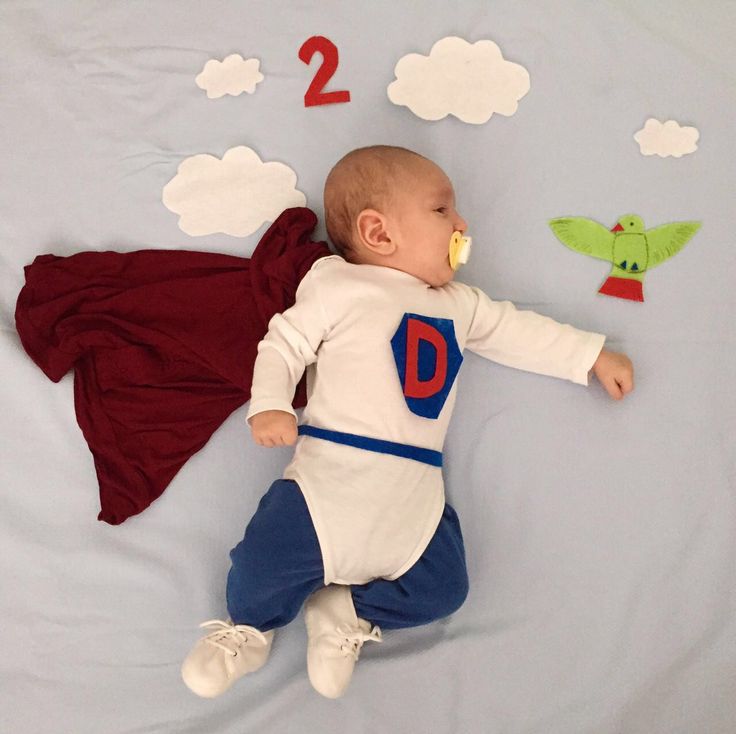How to help young child through divorce
Supporting Kids During a Divorce
One of the biggest priorities during a divorce is ensuring that children continue to thrive. While it is undeniable that divorces are challenging for kids of all ages to handle, the good news is that there is a lot that parents can do to make sure their children feel supported during the process.
Once you’ve told your kids that you’re getting a divorce, it’s common for them to go through an adjustment period. You, too, will likely be going through a period of adjustment as family bonds are being reconfigured and a new “normal” is established.
Stephanie Samar, PsyD, a child psychologist, recommends not being too alarmed by some of the reactions you may be seeing early in the transition. “Think about how chaotic it feels for the adults in the situation, who have at least some control,” she notes. “That adjustment period has to happen, so honor it and don’t start to send the message ‘I just want you to be happy.’” You don’t want to inadvertently pressure kids to feel like they need to be on board and happy about a divorce. While it may be true, of course, that you just want your kids to be happy as soon as possible, giving them the room to process their own feelings is an important part of adjusting.
Respect their emotions
One way to let kids know that it’s okay to feel upset or angry is to encourage them to share how they’re feeling. Dr. Samar recommends saying, “We want to know how you’re feeling about this, and you’re not going to hurt our feelings if you tell us how you feel.”
This may be easier said than done, since what your child has to say might be difficult to hear, but it’s important to give her the chance to be honest. Kids sometimes try to protect their parents from the truth about how they’re feeling because they don’t want to make their parents feel upset — or more upset, if kids are already worried about a parent who’s unhappy about the break-up. But it isn’t a child’s job to make a parent feel better, and you don’t want to inadvertently send the message that you will be sad if your child is sad.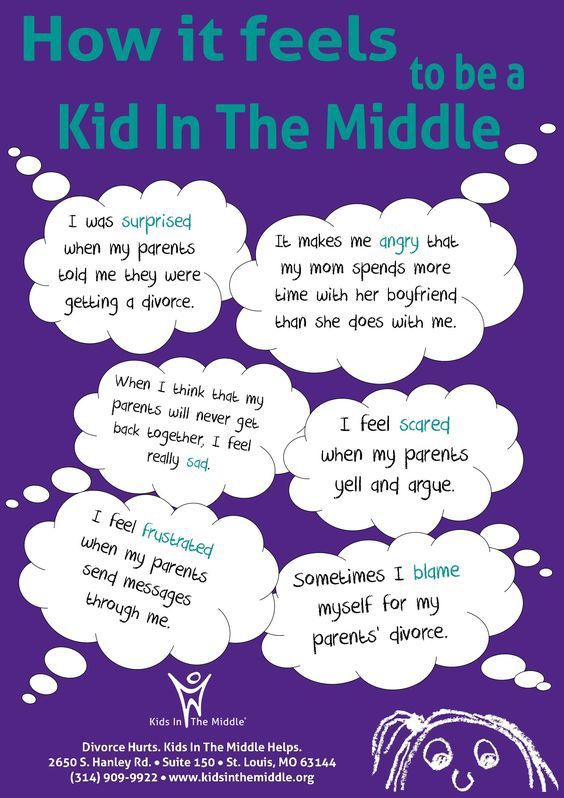 Make it clear that you are interested in what your child has to say and, as Dr. Samar says, “then be careful not to let it hurt your feelings. Get whatever support you need to deal with how you feel and how your child feels and how that impacts you.”
Make it clear that you are interested in what your child has to say and, as Dr. Samar says, “then be careful not to let it hurt your feelings. Get whatever support you need to deal with how you feel and how your child feels and how that impacts you.”
As part of respecting your child’s emotions, do your best to just listen and not intervene. It’s every parent’s instinct to jump in and protect their child from things that are painful, but divorce is inevitably painful. Taking a step back and just listening allows your child to feel heard and feel that her opinion matters. It also lets her know that her emotions aren’t a problem to be solved or “gotten over.” This requires careful listening and empathizing, which psychologists call “validation.” For example, if your daughter says she is angry, instead of immediately looking for a way to cheer her up, you could validate that emotion by saying that you understand why she might feel that way and invite her to tell you more.
What to expect, and how to respond
While it is normal for kids to have an adjustment period in which they might be struggling, there are things you can do to help your kids cope in the healthiest way possible. Here are some common worries or behaviors parents might see, and how to help.
Here are some common worries or behaviors parents might see, and how to help.
Guilt
It is common for kids to worry that they did something to cause their parents to get divorced, especially younger kids, notes Jamie Howard, PhD, a clinical psychologist at the Child Mind Institute. “Kids are more prone to blaming themselves when they’re younger because they’re so egocentric,” says Dr. Howard. “Even if you think they understand it, that’s something you want to make sure that you tell them explicitly: It’s not their fault.”
Anxiety
Divorce means some fundamental changes in routines, which can make many kids anxious. If you notice signs of anxiety in your children, one way to help is to make it very clear to children what they can expect. For example, what will their new living arrangements look like? For younger kids, it might help to post a calendar on the wall to show them where they will be each day.
Children will be reassured if you are able to establish a consistent routine, and as a parent you should make that a priority. “We see kids struggle more if their parents are struggling to figure out how to co-parent and what that’s going to look like,” says Dr. Samar. “So the earlier that you can establish ‘You’ll be here for these days and here for these days’ and have that be consistent and predictable, you’ll see kids settling in quicker and having less struggle.”
“We see kids struggle more if their parents are struggling to figure out how to co-parent and what that’s going to look like,” says Dr. Samar. “So the earlier that you can establish ‘You’ll be here for these days and here for these days’ and have that be consistent and predictable, you’ll see kids settling in quicker and having less struggle.”
Behavior issues
Children may start acting out more, too. This may be another sign of anxiety or it may be out of a desire to figure out what the new boundaries are. Either way, creating a structured environment with clear expectations of behavior should help.
“Kids might see this as an opportunity to test new boundaries, and without as much of a structured environment, their behavior might get worse. As much as possible keep things structured in the same way in both households,” Dr. Howard advises.
RegressionIt is also common for kids to respond to a big transition in their lives by needing more parental attention. “Some kids will be needing more parental and adult support with things they used to be able to do independently,” says Dr. Samar. “You might see their sleep routine is disrupted or they’ll need you to do some self-care things for them a bit more than they used to.”
“Some kids will be needing more parental and adult support with things they used to be able to do independently,” says Dr. Samar. “You might see their sleep routine is disrupted or they’ll need you to do some self-care things for them a bit more than they used to.”
Withdrawing
Parents might also see the opposite — kids becoming more withdrawn or aloof. While giving children their space is important, you still want to create opportunities to spend time with them, so consider suggesting a special outing that may be particularly appealing or other ways to bond. Make sure, too, to do your best to be available to talk if your child wants to, and do a good job listening to what he has to say when he does.
If you notice that your child is losing interest in activities that he used to enjoy, or not wanting to spend time with friends, try to get him back on track. You want to help maintain a sense of normalcy, and these outlets are important. Wanting to withdraw may also be a sign of depression, adjustment disorder or school refusal, which are all linked to divorce, so you will want to keep an eye out if your child continues to avoid things.
Trouble focusing
Some kids may also start experiencing difficulty concentrating on school work. Life might be feeling very chaotic, so do your best to create predictable, reassuring routines at home, including a regular homework routine. It’s also a good idea to alert teachers to the fact that your family is going through a divorce, so that your child can get extra support at school if she needs it.
Good parenting tips during a divorce
Model calm: As much as possible, you want to model “we’ve got this,” says Dr. Howard. “Even if it’s not true, even if only one parent has got this. Particularly if you have young children, then you get it to work.” Modeling calm and insulating children from conflict are important during this time. Likewise, try to maintain as much normalcy as possible with home life and extracurricular activities. When changes do need to be made, create new routines and try to stick to them.
Be civil about your ex: It’s not healthy for children to have unnecessary conflict in their relationships with their parents, so do your best not to speak negatively about your spouse around your child.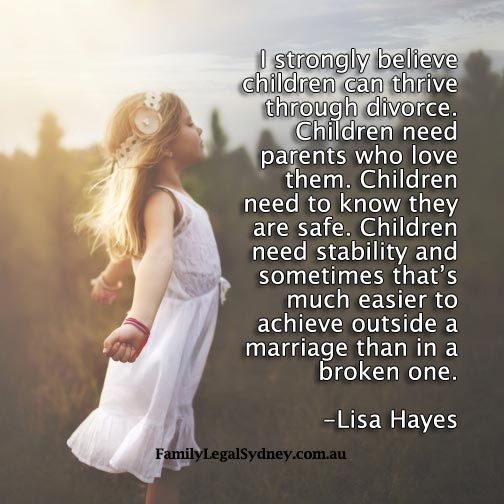 “Someone could be a lousy spouse and a good parent,” notes Dr. Howard, “and you really don’t want to deprive your child of a good parent. Kids do better with two loving parents, divorced or married.”
“Someone could be a lousy spouse and a good parent,” notes Dr. Howard, “and you really don’t want to deprive your child of a good parent. Kids do better with two loving parents, divorced or married.”
Sometimes conflict can arise once you begin working out how to co-parent. You may need to make compromises or take turns making decisions. Whatever you do, try to present a united front to your child as much as possible. If your spouse really isn’t willing to be cooperative, do your best to set routines and expectations for your home, since you do have control over that.
Get support: Talk to your child’s school counselor or teacher to find out if there are any services available through the school. Many schools have programs for children who are going through a divorce, such as Banana Splits, which is a divorce support group for kids.
Also, if you are struggling, make sure you are getting support for yourself. Talk to your friends and family if you are feeling overwhelmed and ask for favors if you need them.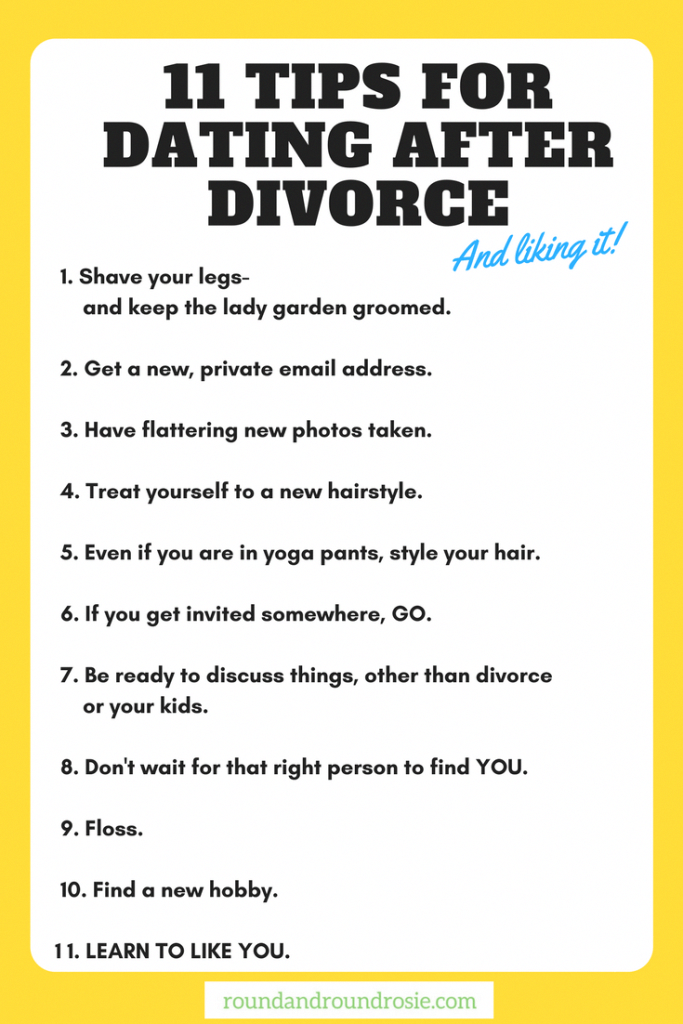 People often want to help out, but they don’t know what to do, so let them know if you need a hand with the groceries or just want to let off some steam. If you think you might benefit from talking with a therapist, don’t hesitate to make an appointment. Remember, you can best support your child if you are feeling supported, too.
People often want to help out, but they don’t know what to do, so let them know if you need a hand with the groceries or just want to let off some steam. If you think you might benefit from talking with a therapist, don’t hesitate to make an appointment. Remember, you can best support your child if you are feeling supported, too.
8 Strategies for Helping Kids Adjust to a Divorce
Divorce is not easy for parents or kids. Everyone in the family feels a tremendous sense of loss and anxiety. The family as they know it will no longer be the same.
In order for parents to be of the best help to their kids, they need to work with their own emotions, especially a common guilt they feel towards their kids. It is helpful for parents to recognize that coupling is one of the hardest things to do in the world and as a result divorce occurs in 50% of all marriages. It is nothing to be ashamed of. In many cases, it is better for everyone involved to sever a relationship that is causing grief.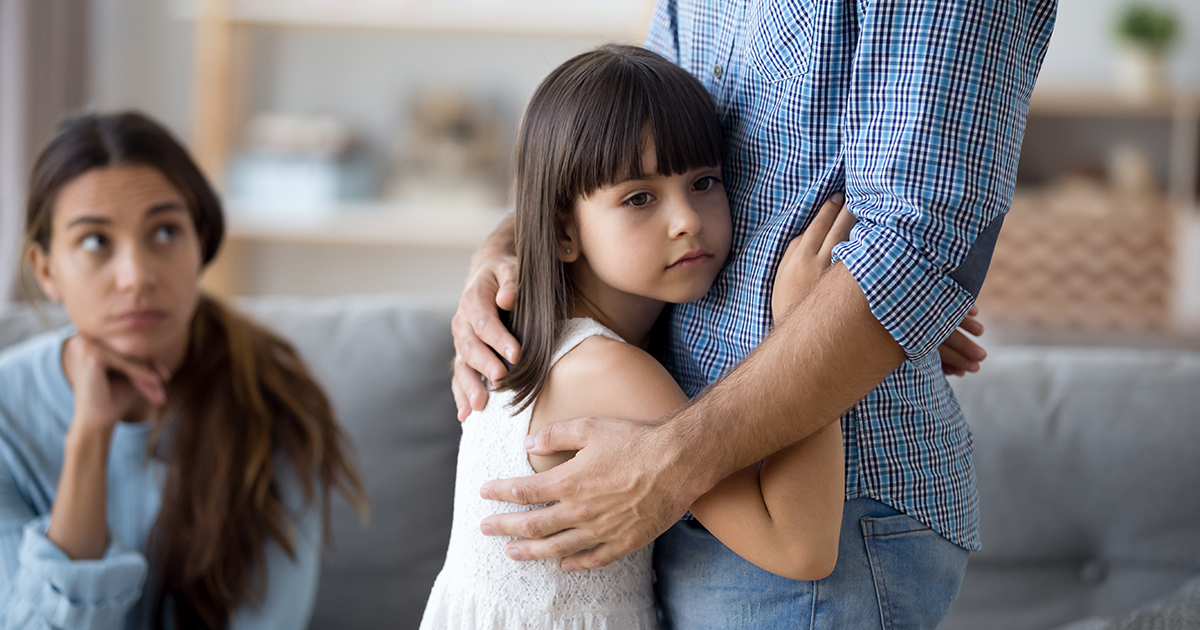 Children experience a great deal of anxiety when they live with constant parental discord. In fact, in many situations, children do better when they relate to each parent alone in a healthier environment. If parents accept their decision and present it as natural part of life, they can help their kids to overcome the difficulties. Here are some strategies for handling the challenges ahead:
Children experience a great deal of anxiety when they live with constant parental discord. In fact, in many situations, children do better when they relate to each parent alone in a healthier environment. If parents accept their decision and present it as natural part of life, they can help their kids to overcome the difficulties. Here are some strategies for handling the challenges ahead:
1. Explain the divorce in a simple straightforward way. When possible, both parents should talk over how to explain the situation and have the discussion with the children jointly. They can explain, for example, “Mommy and Daddy fight all the time and it makes us all unhappy. We've decided it would be better for all of us if we live in separate houses.”
2. Reassure your children that they will always have both parents' love and explain how things will work. For instance, “You will spend every other weekend and Thursday nights with Daddy. The rest of the time you will be with Mommy.” For young kids, you can play out the new arrangement with dolls or stuffed animals. Putting up a calendar also helps the kids feel more reassured that they will have time with both of their parents.
Putting up a calendar also helps the kids feel more reassured that they will have time with both of their parents.
3. Talk about the emotions that kids naturally feel under these circumstances. You might explain, “It is normal to feel sad and angry about a divorce. These feelings are hard to deal with alone. When you feel angry or sad tell Mommy or me. You can say, 'I feel sad,' or 'I need to talk,' and 'we'll help you.'” Encourage your kids to have an on-going dialogue with you and demonstrate that you accept any feeling they have. Sometimes kids keep their feelings inside because they do not want to upset you. Check in with your kids frequently by asking, “How are you feeling about the divorce?”
4. Reassure your kids that the divorce is not their fault. Kids tend to be “egocentric” and believe that their behavior or thoughts cause bad events. They need to know that the adults have made this decision based on their relationship and it has nothing to do with them.
5. Avoid talking badly about the other parent or blaming the individual, even if you are angry. Children love and need both of their parents. They can easily experience a loyalty conflict and feel badly and this will deter an open dialogue. Children need to feel both of their parents are valuable because each child is a composite of their two parents.
Children love and need both of their parents. They can easily experience a loyalty conflict and feel badly and this will deter an open dialogue. Children need to feel both of their parents are valuable because each child is a composite of their two parents.
6. Give your children ample advance notice before a parent moves out. It works really well if the children are able to visit the second home and know where they will sleep when they visit. It is wonderful to involve the children in helping to furnish the apartment and bring over some of their possessions.
7. It can be very helpful if you work with a parenting expert, or a family therapist who has experience with divorce and can give you guidance on how to handle tough situations that arise. Children also gain a great deal from talking to a therapist on their own. They often are freer to express feelings that they think will hurt their parents.
8. Be aware that when a family is going through a divorce, children can act up, withdraw or regress.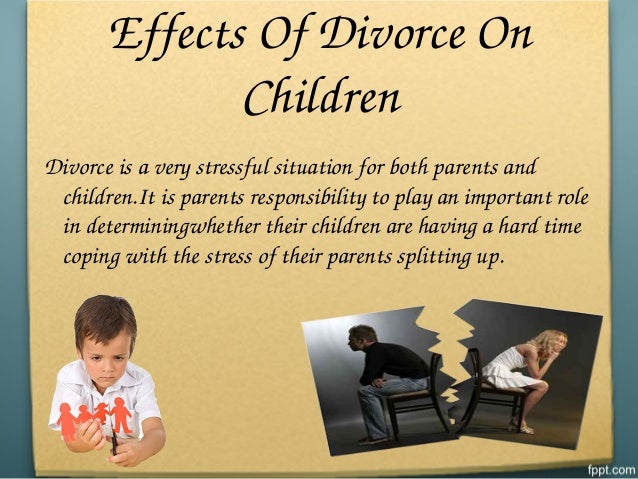 It's not uncommon for children to wet their bed, or refuse to listen. They will need extra time, support, and open communication. Over time these symptoms will dissipate as they adapt to the changes. Planning some favored family events will give the kids the feeling that life will go on as usual.
It's not uncommon for children to wet their bed, or refuse to listen. They will need extra time, support, and open communication. Over time these symptoms will dissipate as they adapt to the changes. Planning some favored family events will give the kids the feeling that life will go on as usual.
There is no question that a divorce is hard on everyone in the picture. But if children continue to feel loved by both of their parents and parents work to create a stable calm environment for their children, children can emerge from the situation in good shape. Over time, they will be calmer as they see everything becoming a familiar routine.
6 ways to help a child survive a parental divorce
Psychology
The divorce of two adults is always about a personal crisis for each of them. Few people realize that in fact this same crisis is an important path to transformation and acceptance of oneself in a new incarnation.
Psychologist, coach, sex therapist
But when a divorce occurs in a family with children, it is scary and painful for parents to hurt their child with this decision.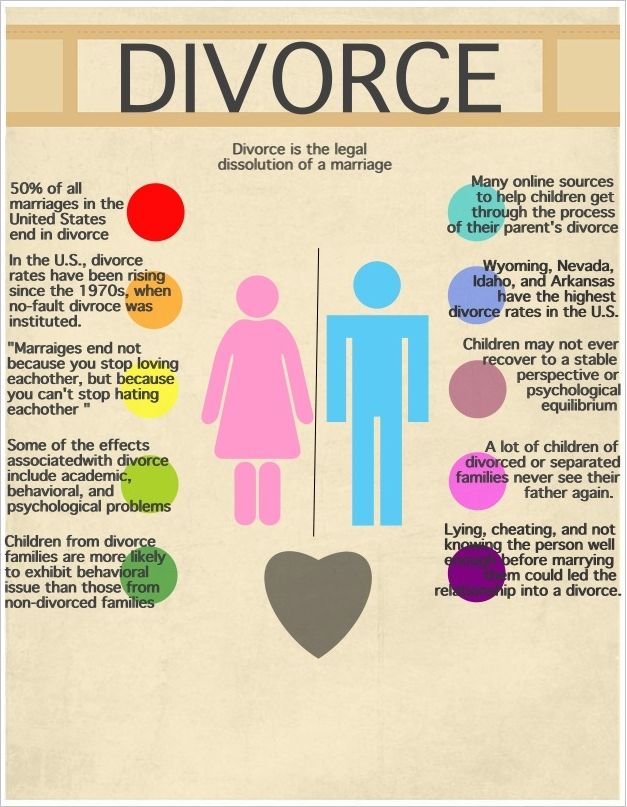 ELLE.ru psychologist Safronova Sofya tells how to help children survive a divorce, as well as how to make the process of parting delicate and environmentally friendly for the whole family. nine0003
ELLE.ru psychologist Safronova Sofya tells how to help children survive a divorce, as well as how to make the process of parting delicate and environmentally friendly for the whole family. nine0003
1. Do not include the child in your "parental" dialogue
The child does not experience disappointment in mom or dad, as well as the collapse of hopes, splitting of supports and bitterness that exists in the relationship between parents. In fact, every child experiences exactly what adults broadcast to him. Therefore, the main advice to parents is to calmly convey their feelings to the child, without dramatizing the separation and without dumping the function of a psychologist on the child. It should not be included in your personal experiences. nine0003
- Photo
- Getty Images
2. Help your child recognize his feelings and put them into words
It is often not entirely clear what is happening in the world of a small person, because he has not yet learned to recognize feelings, understand them and accept them. In the difficult period of divorce, each child is looking for psychological support in the form of an adult whom he can trust. Therefore, in no case do not lose contact with the child: ask him questions, ask about his feelings, dreams, fears and dreams. Delicately clarify what he means by this or that statement, what he has expectations of you and how he relates to the situation as a whole. Do not be silent, do not fill the void, let your child's emotions be. You can also go to family therapy or take the child a separate psychologist. nine0003
In the difficult period of divorce, each child is looking for psychological support in the form of an adult whom he can trust. Therefore, in no case do not lose contact with the child: ask him questions, ask about his feelings, dreams, fears and dreams. Delicately clarify what he means by this or that statement, what he has expectations of you and how he relates to the situation as a whole. Do not be silent, do not fill the void, let your child's emotions be. You can also go to family therapy or take the child a separate psychologist. nine0003
- Photos
- Getty Images
with a psychoanalyst. Let him know that you are still caring parents and that he can rely on you, even if you are divorced. Remember that after your separation, the child has the birth of his own world, which is full of news, stories, knowledge and worries. Stay a foundation you can rely on.
 nine0003
nine0003 - Photo
- Getty Images
4. Work on your psychological state
It is really obvious to your child that the parents divorced, but in their own way. Therefore, it is important for both mother and father to develop a unified strategy for positioning the situation, which you will adhere to. For example, a mother should not rush about in passions and tell her child different versions of events a hundred times a day and change her mind. Alone with yourself or a psychologist - please. And with a child, each parent should stick to one eco-friendly version, to which his young psyche will get used. And try to attach less importance to the divorce itself. Discuss and analyze the feelings that the child experiences daily more often. nine0003
- Photo
- Getty Images
.
 Be honest with your feelings, but also respect the feelings of the little person. Do not convey your fears and disappointments to him, accept your weaknesses in yourself, but separately from the child. Do not give your husband's behavior and, in general, the circumstance of divorce a personal coloring: you do not know what your child will face in his life and why this experience of divorce of his parents is for him. nine0003
Be honest with your feelings, but also respect the feelings of the little person. Do not convey your fears and disappointments to him, accept your weaknesses in yourself, but separately from the child. Do not give your husband's behavior and, in general, the circumstance of divorce a personal coloring: you do not know what your child will face in his life and why this experience of divorce of his parents is for him. nine0003 - Photo
- Getty Images
6. Communicate with your child on various topics and fill life with events
It is important to understand that divorce occurs with parents, but the child's life continues to go on as usual. Of course, the very situation of parting with the numerical amendments in the family has a place to be, but all the disappointments are yours. Your child will appropriate his own disappointments through his experience.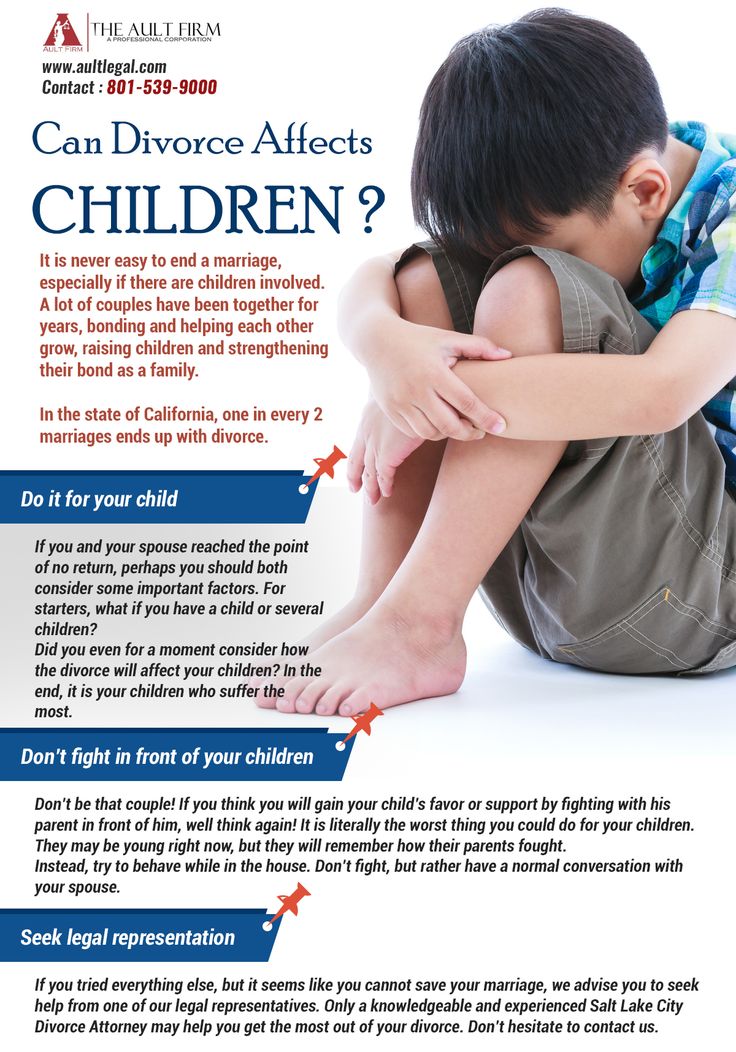 Often, parents transfer their sorrows to the child, heaping on small shoulders the role of a rescuer and psychotherapist, where the child becomes a subject for manipulation. This is scary and toxic. Therefore, it is important to communicate on topics that are interesting to your child, and leave your problems and stress for consultation with a therapist. nine0003
Often, parents transfer their sorrows to the child, heaping on small shoulders the role of a rescuer and psychotherapist, where the child becomes a subject for manipulation. This is scary and toxic. Therefore, it is important to communicate on topics that are interesting to your child, and leave your problems and stress for consultation with a therapist. nine0003
Yuliya Lifanova
Tags
- Divorces and separations
6 tips from a psychologist to help a child survive a parent's divorce - light blog
Perhaps now the grandmother will pick up the child after school, or you will be forced to work on weekends. An accessible explanation of the changes will reduce the level of tension and stress. The unknown is scary. When you explain what will change and who will take on new roles (grandmother, nanny, tutors), the child will be better able to navigate the situation and be able to calm down.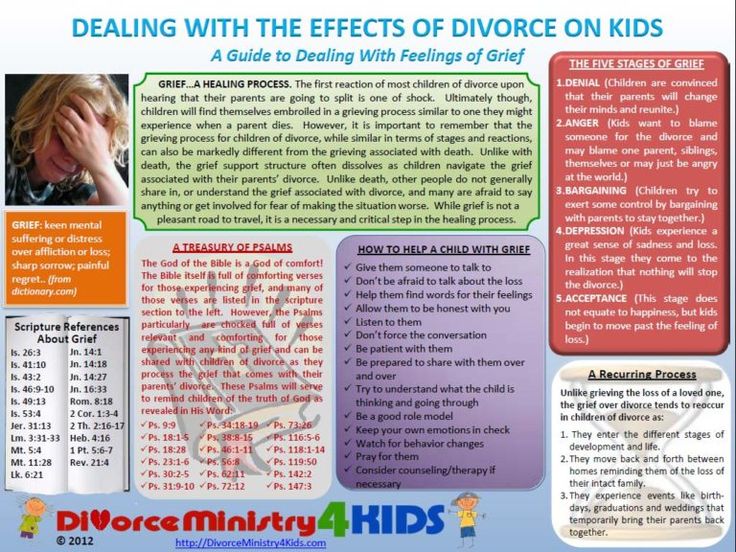 nine0003
nine0003
Divorce is often perceived by children as the loss of a father who will no longer live with you.
It is worth reminding the child: “Even though we don't live together, dad and I love you very much and want to spend time with you. You and dad can go to the park on Saturday. And I’ll buy pizza, and then we’ll watch a cartoon together.”
Such reminders that not only you, but also the father loves the child, help the son or daughter feel valued for both of you.
Also, you do not form a negative image of the father in the eyes of the child. nine0003
If the father does not communicate with the child after the divorce, try to share his sadness.
Explain that it's okay to be upset and miss someone important.
Does the child say that he is angry with you? Ask about the reasons and how to help him. Sometimes kids get angry when they don't understand something. There is a chance that after finding out the reasons, you can talk openly and allay the fears.
Your very presence and opportunity to share experiences is very essential for a child. Don't deny his pain or desire to cry. He is going through a difficult period, just like you, and has the right to experience different emotions. nine0003
It is very important to understand the condition you and your child are in. Children react differently to the divorce of their parents, but there are a number of patterns.
Back in 1969, Swiss-born American psychologist Elisabeth Kübler-Ross described the stages that go through those who experience grief.
Divorce brings changes and losses in the family. Therefore, it is likely that the child or you can deny the situation.
Then anger may come : self, partner or child. Sometimes such anger is irrational.
Bargaining as the third stage manifests itself in the fact that you (or the child) think: “What would happen if ...?”, scroll through the many options: how you could change the situation or prevent a divorce.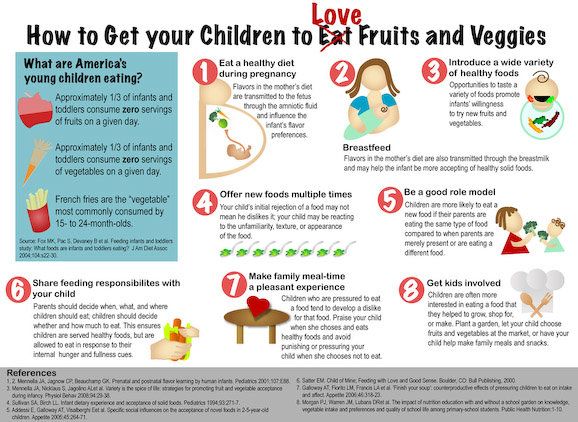
After trading, a significant decline in strength and emotions may occur, that is, a depressive state . During this period, a person is very hurt, there is an understanding that the situation cannot be changed. As a rule, then comes acceptance. nine0003
At the bidding stage, the child thinks and plays various thoughts in his vivid imagination: “Perhaps dad would have stayed with us if I had been more polite?”, “Maybe our family would have continued together if I hadn’t capricious?
The child may believe that it was he who led the parents to now live separately. He is tormented by various suspicions and experiences that are not always possible to clearly formulate for others.
That is why it is necessary to support the child in every possible way, emphasizing that it is not his fault in what happened. nine0003
Of course, it is worth talking about it when you notice that the child is trying to tell you or show his guilt.
Sometimes feelings or negative emotions overwhelm us.







1.jpg)

